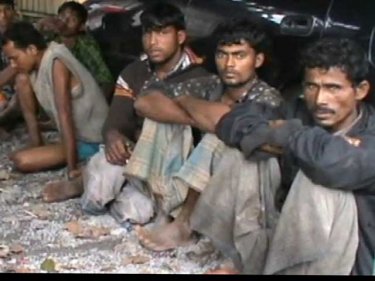Those held were in five minivans in a convoy bound for the Malaysian border crossing at Padang Besar in Songkhla province.
On December 24 a police-Army checkpoint in Satun province pulled over two of the vans, which each contained 22 men and boys.
The drivers of another three minivans fled after dropping off their passengers, who totalled 83.
The youngest of those arrested was a boy aged 10. Most of the captured Rohingya were teenagers or young men.
Hundreds are fleeing the Burmese state of Rakhine where thousands of homes have been torched since June in a simmering racial conflict between local residents and the Muslim Rohingya.
About 170 are reported to have been killed in the conflict, which has left thousands of Rohingya confined in displaced persons camps.
Many prefer to take their chances by paying people smugglers and fleeing by sea, with Malaysia as the target for most.
How the Rohingya arrested on December 24 got to Songkhla province in southern Thailand is not known. Part of their journey was probably made by sea.
Brokers on the Thai-Malaysia border are known to systematically transfer Rohingya south from camps hidden in plantations in Thailand with the connivance of officials in both countries.
The arrest of the 127 may have come because the officers at the checkpoint are not part of the system or rival brokers have perhaps fallen out.
The arrests were made by officers from Khuankalong police station in Satun, where Lieutenant Sompong Meechoo said local police were not part of any smuggling group.
''The Rohingya will be trucked straight back to Ranong,'' he said, referring to the Thai-Burma border port hundreds of kilometres to the north where the arrested men and boys could possibly have stopped off on their journey.
Because the arrested Rohingya are inevitably all men and boys, some reports speculate that they could be heading to join the insurgency in Thailand's south.
Thailand's Internal Security Operations Command has checked out these reports over several years but never found evidence to justify them.
Isoc tallies 2817 Rohingya arrested or ''helped on'' in Thailand in October and November.
Other experts in the deep south conflict say there has never been an instance where a single Rohingya has been killed or injured in incriminating circumstances in eight years of conflict.
Chris Lewa, director of the advocacy group Arakan Project, said: ''Rohingya only transit through Thailand on their way to Malaysia, helped on by Thai authorities.
''There has never been any evidence of Rohingya involvement in the deep South insurgency.
''Why should countries in the region repeatedly make these kinds of assumptions just because they are Muslims?''
The Rohingya are protective of their womenfolk, who seldom venture far from home. However, having a boy of 10 among the latest batch of arrests indicates some are becoming more desperate to flee Burma.
Hundreds of Rohingya are believed to be voyaging past the Andaman coast and the holiday island of Phuket this relatively tranquil October-April ''sailing season.''
Those apprehended on land north of Phuket are usually trucked quickly back to Ranong, often described as Burmese to reduce complications.
As stateless non-citizens, the Rohingya are not wanted back in Burma so they are usually delivered to people smugglers.
The smugglers demand extra payments and those who cannot meet the terms are usually put to work in fish factories or indentured to trawlers.
Earlier this month, Singapore refused to allow a Vietnamese cargo ship to dock with 40 Rohingya who survived a sinking in which 200 are thought to have drowned.
All of Burma's Asean neighbors continue to turn a blind eye to the tacit ethnic cleansing of the Rohingya now underway in Burma.










The treatment of the Rohingya is not much different from what the Jews suffered in the 20th century Europe or the actions of the Serbs following the breakup of Yugoslavia.
They have already been denied human rights, being outcasts in their own country, persecuted for their religion and now sent to concentration camps.
Call them refugee camps if you want but surely we all remember images from the Nazi camps. Compare them to those from the Serbian run camps and they are frightingly similar.
I have yet to see any images from the Rohingya camps but maybe some brave journalist will get them for everyone to see.
I wish countries had the moral backbone to withhold investment until the Rohingya issue is amicably solved.
Posted by Andrew on December 27, 2012 17:20